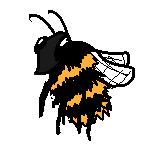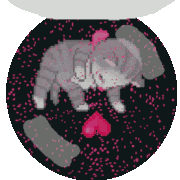|
Welcome to BYOB: Bring Your Own Book. ITT I will review short stories suggested by posters. The purpose of this thread is to discover new and interesting stories and laugh at the really bad ones that we come across. Three guidelines: 1. No stories with bannable or probation-deserving content. 2. No stories that require previous knowledge, such as sequels. 3. No stories longer than 15,000 words, otherwise this would take too long to keep the thread alive. I encourage others to take part in reviewing, there are a lot of people here funnier than me and with a finer eye to nuance. To set us off, I reviewed two stories, one very good IMO, the other one less so. I will let you guess which is which. quote:TO BUILD A FIRE - JACK LONDON (http://en.wikipedia.org/wiki/To_Build_a_Fire) quote:LEAKAGE - ANONYMOUS (http://creepypasta.wikia.com/wiki/Leakage) H.H fucked around with this message at 15:00 on Jan 25, 2015 |
|
|
|

|
| # ? Apr 25, 2024 04:38 |
|
Roog by Philip K. Funnyword: http://sickmyduck.narod.ru/pkd055-0.html |
|
|
|
|
Please do "funes the memorious" or alternately "the library of babylon" by luis borges... you'r choice they both good |
|
|
|
|
The Use of Force by William Carlos Williams |
|
|
|
pig slut lisa posted:Roog by Philip K. Funnyword: http://sickmyduck.narod.ru/pkd055-0.html This is an interesting piece by my favourite science fiction writer, Philip K. Dick. Dick writes Sci-Fi in the broadest sense of the term, not limiting himself to technology or some period of the distant future. His work, as that of any good writer, derives its strength not from its genre but in the way it challanges our accepted view of the world. This particular story has two focal points: human and canine. The plot itself is very basic, constructed around the way the protagonist, a dog named Boris, sees himself as part of his surrounding and the actions taking place in his world. While we understand the events taking place in the context of human day-to-day life, this story allows us to put on a pair of furry glasses and see a world that canine evolution and psychology, if I may use this term, has not prepared itself for. As I see it, the strength of this story comes from the helplessness of animals which are tied down by circumstances they cannot control, both figuratively and metaphorically. This tale of despair can be used as an ultimate argument of animal rights activists: nothing is more telling of personhood and suffering as trying to make sense of the world around you and failing to do so. We often see this in toddlers, lacking the language skills to convey what they want to their parents. Dick did a phenomenal job in doing the same thing for dogs. A must read for parents, linguists and animal lovers. |
|
|
|
alnilam posted:Please do "funes the memorious" This is a bit long, but any shorter would be a disservice to Borges: quote:FUNES THE MEMORIOUS |
|
|
|
dogcrash truther posted:The Use of Force by William Carlos Williams "The Use of Force" intrigued me, not least because I found it very hard to analyze. The style is very direct and focused, allowing for only an indirect characterization; the plot is centered on only one scene (and a dynamic scene at that), making it difficult to build any sort of image in our head as to the setting of the story. Nevertheless, the question with which we are presented shines crystal clear: do we, as people or even doctors, have the authority to use force and coercion in case of someone resisting potentially life-sustaining treatment? Since the story was published in 1938, this topic has been debated and discussed countless times, but we are still in no way near a unanimous answer. Each bio-ethics committee sees it differently, every culture and religion have their own view of the matter. Christians and Muslims sanctify the concept of death through suffering, but make the effort of saving every life (that is, the overwhelming majority of the myriad of branches do). Jews value life beyond almost everything else, and so force treatment even on those who refuse it, even in the case of criminals and people whom society judges as less deserving. Stoics saw suicide as not only dignified but in some cases obligatory. Some modern countries allow for euthanasia (notably Switzerland), while others deny even the possibility of a patient choosing to terminate life-sustaining procedures. The doctor, our protagonist, sees the other characters by their attitudes towards this matter: on the one hand the parents of the patient, who make the decision of forcing treatment on her, are seen as weak, contemptible. On the other, the girl is willful, taking her fate into her own hands for better or worse, and fighting to keep her independence. The story does not provide us with clear-cut solutions to this problem. I would even go so far as to say that it is not expected of us to think of any. Instead, we should simply accept that the best questions must remain unanswered. |
|
|
|
|
The Last Question by Isaac Asimov © 1956
|
|
|
|
A request from the irc channel: Harime Nui posted:Please do "A hunger Artist" by Kafka A HUNGER ARTIST Kafka tells the story of a so-called "hunger artist", a sideshow of professional fasting. The subject matter seems very remote to modern readers, but contemporaries of Kafka still remembered a time when sideshows were very popular. Yet at the time of writing, this already seemed like a cruel and barbaric form of entertainment. So why this subject matter? The protagonist, the unnamed hunger artist (which in the title does not even get the privilege of a definite article), is interesting to Kafka, and by extension hopefully to us as well, due to his remarkable character. He is an artist in the true meaning of the term: eschewing easier employment, ready to sacrifice himself for his art, passionate. I am reminded of Jules Verne, who claimed that a professional soldier is an artist as well. This is harder for us to stomach, perhaps, with our modern sensibilities and a lifetime of reading Hašek, Heller and Vonnegut, but I am forced to agree: the true soldier does not fight out of a sense of patriotism, does not risk his life at the command of occasionally inept or downright uncaring and glory seeking officers out of fear of punishment, but sees combat as the ultimate expression of his inner being. Though the protagonist claims it is easy to fast, it is a form of self-expression for him. His calling is not in resisting his urges, but in exposing his audience for their prejudice, if only to himself. Just like the bearded lady, fasting is part of him and not a feat he struggles to accomplish. Even as we try to get into the mind of the artist, we can easily fall into the trap set for us by Kafka, namely becoming his audience: at first marveling, soon losing interest, and at last feeling only pity. However, it is imperative to understand that what we see as borderline-suicidal is the point to which his whole life had been leading him. His greatest triumph is not of survival, but of the human spirit, a martyr to his cause. The ending left me somewhat dissatisfied, being too unambiguous for my liking. Despite this, the overall piece stands out as a testament to Kafka's power to show us the emotional gap between the protagonist and the world around him, which reveals just as much about the latter as about the former. |
|
|
|
|
do mine
|
|
|
|
|
A good man is hard to find - Flannery O'Connor. |
|
|
|
emmie posted:The Last Question by Isaac Asimov © 1956 I'm sorry if this seems to be taking to long, these reviews are pretty time-consuming and intelectually demanding for me. quote:This story by Isaac Asimov is tricky. It can be said that there is only one character of any significance, and even it is not really an entity, but rather a succession of increasingly more complex entities, reaching its final form in the climax. |
|
|
|
|
Cool thread |
|
|
|
|
Review... this thread |
|
|
|
thanks. I actually considered at some point to review someone's post history, but it would take forever and require plat, which I don't have. maybe if this thread gains some traction i'll get the upgrade and do it. |
|
|
|
|
H.H posted:"The Use of Force" intrigued me, not least because I found it very hard to analyze. The style is very direct and focused, allowing for only an indirect characterization; the plot is centered on only one scene (and a dynamic scene at that), making it difficult to build any sort of image in our head as to the setting of the story. Nevertheless, the question with which we are presented shines crystal clear: do we, as people or even doctors, have the authority to use force and coercion in case of someone resisting potentially life-sustaining treatment? Ya...personally what's most interesting for me is the way WCW exposes the moral and ethical challenges in the use of force. The doctor has to hurt the girl in his capacity as a professional, and he also maybe has to hurt her because he wants to help her, but he also wants to hurt her because she and her family have challenged his pride and sense of control. Is his professional duty just a smoke-screen for his will to power, do they exist safely together, or do they compromise one another in a variety of ways or what. I think the implications are broader than just medical ethics and go to the heart of any kind of relationship of authority. Policemen for instance have to hurt people sometimes in their job, but we should also be aware that they may want to hurt people as well. How do we deal with that? |
|
|
|
|
hh, did you still need volunteer reviewers? I'm here to make good on last nights promise if so also you should review the willows by algernon blackwood (pls pls pls)
|
|
|
|
came here for a review of a short story about byob. gently caress this. |
|
|
|
|
please review one or both of the short stories here http://forums.somethingawful.com/showthread.php?threadid=3687796
|
|
|
|
|
sam,e
|
|
|
|
|
H.H posted:I'm sorry if this seems to be taking to long, these reviews are pretty time-consuming and intelectually demanding for me. good review friend
|
|
|
|
|
ATCG posted:A good man is hard to find - Flannery O'Connor. do tyhis one |
|
|
|
|
someone write a story about aliens discovering the ruins of our civilization, but the only two pieces of video they salvage are September 11th news footage and Disney's Planes
---------------- |
|
|
|
Oysters - Anton Chekhov
For the times that you want to go and bust rhymes real slow, i'll appear, slap you on the face, and enjoy the show. Oh, this dope nose. |
|
|
|
|
ernest hemingway - a clean, well-lighted place https://archive.org/stream/BM282003hemingway/BM28_2003_hemingway_djvu.txtquote:It was late and every one had left the cafe except an old man |
|
|
|
WD-40 posted:hh, did you still need volunteer reviewers? I'm here to make good on last nights promise if so I do. Just please make sure to mention the stories you intended to review before doing so, it will save me a lot of trouble and prevent two reviews of the same story. |
|
|
|
dogcrash truther posted:Ya...personally what's most interesting for me is the way WCW exposes the moral and ethical challenges in the use of force. The doctor has to hurt the girl in his capacity as a professional, and he also maybe has to hurt her because he wants to help her, but he also wants to hurt her because she and her family have challenged his pride and sense of control. Is his professional duty just a smoke-screen for his will to power, do they exist safely together, or do they compromise one another in a variety of ways or what. I think the implications are broader than just medical ethics and go to the heart of any kind of relationship of authority. Policemen for instance have to hurt people sometimes in their job, but we should also be aware that they may want to hurt people as well. How do we deal with that? The will to power is a tricky concept to treat in such a review. Similarly to the fear of death, we must try to approach it as outsiders looking in. Adler based his psychotherapy on the view that power is the driving force behind all human endeavour. If we accept his idea, how can we separate this motive for good deeds from the altruistic one? Let's look at it by drawing a parallel between Adler's second Viennese school and Frankel's third. Frankel argued that we are driven by the will to meaning. If a doctor finds that meaning in helping patients, recognizes this as the thing that actualizes his life, can it be said that he is doing so to accomplish some inner goal? Can the outcome be completely divorced from his inner world? I mentioned soldiers in a previous review. If a true soldier sees his calling in fighting, does he derive a sense of fulfillment, or even pleasure, from the use of controlled violence? Do parents enjoy expressing anger and punishing their children when those misbehaved as a way to channel their own frustration, or is it all done as a form of discipline, intended to bring about a child that is aware of the consequences of his or her actions? Such questions can only be answered by the incomplete method of studying the actions which these forces bring about. Did the soldier or policeman succeeded in their intended missions with minimal injury and loss of life to both sides? Did the child grow up to be a responsible adult, aware of the feelings of others and able to delay gratification? This is where it gets more complicated. What was the desired outcome in our story? The well-being of our patient? Fulfilling the wishes of the patient? This is the question at the heart of the dilemma of ethical committees, and often tells us a lot about the culture which the members of those committees come from. In my opinion, the answer can only be given on a case by case basis. Some of those suffering from depression will end up as people more content with their life in the long term, some will continue to look for ways to end the suffering. Terminal cases with untreatable conditions are more inclined to accept a more violent death (if only in the meaning of its abruptness) than prolonged suffering that will not lead to any relief. Hunger strikers refuse treatment out of ideological reasons, giving meaning to their suffering. Any relationship of authority implies the use of force, and those with authority can only be judged after the fact. So the question they should all be asking themselves at any instance when the use of force is required is "why am I doing this?", "Is it absolutely necessary?" We should always be well aware, however, that desire to do so is the price we have to pay to make use the benefits they bring to society. This is in no way a complete answer, and I'd be more than happy to see others chiming in with their own opinions. |
|
|
|
gas
---------------- |
|
|
|
|
ATCG posted:A good man is hard to find - Flannery O'Connor. This story by Flannery O'Connor, like many of those dealing with the American south, deals with the topic of redemption. Redemption by action as a conscious choice, not necessarily to make oneself right in the eyes of a higher power, but the change in one's ways implicit by a strong enough act. The text is rooted in religious narrative, and so we can analyze it in this way, trying to hear the theological voice of the narrator in our attempt to understand his message. Psalm 1:1 tells us "Blessed is the man that walketh not in the counsel of the ungodly…" (KJV). The motif of walking in the bible is a well-worn one, from Abraham leaving his homeland of Ur to Jesus walking in Judea and the Galilee to those in need of his healing and guidance, both symbols of virtue and teaching among people ignorant of good or even downright wicked. Here too we sense the metaphorical journey symbolized by the family's trip from Georgia on vacation. The trip is cut short and the grandmother, the protagonist, is faced with a choice: how should she act, if at all? Does one simply rejects the ungodly or tries to chastise them? The misfit confesses to never praying, not needing any help, but sees himself as a good man nonetheless. So is the problem evil or just the lack of connection to God? The grandmother makes her choice: she acts, whether consciously or out of instinct. We have two strong-willed characters; on the one hand, the grandmother trying to persuade the Misfit to pray and thus find a way out of the predicament he brought on himself. Along the way, she hopes, or so it is implied, to save herself and her remaining family. Does she attempt to save herself at the expense of her family? Though criticism of this story often focuses on this point, I believe that the more interesting discussion lies beyond it. We have a partial response to this question in the ending, but that ending just gives rise to the opposite question: how would she have acted if the order of the killings would have been reversed, starting with her? The Misfit tries to justify his ways to her, perhaps trying to win the battle of wills taking place between them. He does not reject God or Jesus, showing indifference in the former and a kind of curiosity in the actions of the second. Raising the dead is seen by him as the pinnacle in the acts of Jesus during his life on earth, maybe antithetical to his own actions. "[I]f I had of been there I would of known and I wouldn't be like I am now", we read in his own voice. Is this the case? Is he just trying to explain his actions to the one who is tasked with undoing the Misfit's harm? The Jewish Haggadah tells us of the evil son, who is asking of the rest what is the reason for all this (meaning the Passover service), why are they doing this? His transgression is that he removed himself from the group, broke away from the community. The response to this is that if he was there (meaning, as a Hebrew slave in Egypt) he would not have been saved. We can make the parallel to the Misfit. He wants to be there, to see for himself, but by removing himself from common morality and the need for prayer, rejecting forgiveness, Jesus would not have been able to provide him with the much needed answers. He is the way he is not because he didn't witness the true revelation; he didn't witness or accept the true revelation because of the way he is. Prayer can correct this, but he continues walking in the path of the ungodly, not as a thoughtless action out of greed or malice, but as a personal choice. In the end the grandmother falters and loses the moral high ground, and with that the story comes to an end. But did the grandmother really was the voice of true morality it at any point, or was the choice of the misfit well justified by his own view of the world and thus he cannot be judged? The story ends with the Misfit claiming that "[killing is] no real pleasure in life." It is not the killing itself that that is in the debate at the center of the story, but rather how we need to address a man who has rejected the path of the godly in search of his own way. By trying to decide on the qualities of the story and how it relates to us, we ourselves are making a moral judgement. This review was wholly devoted to the theological side of the story (rather than the more accepted moral interpertations), and of course it can be analyzed in a lot of different ways. I'd love it if you would contribute with your own views on the matter, challenging what I wrote here or adding your own thoughts. |
|
|
|
alnilam posted:please review one or both of the short stories here THE HEART AND THE BOTTLE - OLIVER JEFFERS This touching children's book tells the story of a girl, "much like any other", who displayed one of central characteristics of children, part of what makes them so endearing to us: their sense of wonder. Fascination with the outside world, being receptive to new experiences, ready to learn all the world has to teach you. This is truly what separates children from the often jaded adults. However, this comes at a price: letting one's heart open to new sensations can make it vulnerable. This indeed, is at the heart of this tale. Hurt from a devastating loss, she shields her heart, only to discover it has been closed to wonder. This is what essentially turned her into an adult, one that no longer finds the world as a new and fascinating place. Note that she is called "a girl" only once, at the beginning of the story. This is deliberate. At some point, she ceases to be the girl. I would argue that it is at the instance of relinquishing her heart's openness in exchange for safety. The only way to retrieve her heart is by using the wonder still found in the heart of children. Realizing how children relate to their surroundings can make us appreciate those surroundings once again. It is said that parents often feel this, this sense of renewed energy from children, people whose very presence can make you see the world around you differently, hopefully the way you did before. Parenthood is often said to be the greatest experience one can have, and I firmly believe that it is in no small part because of this. We are given a partial solution to this problem of the loss of childish wonder: books. They fill our minds, stimulate our imaginations, and instead of simply answering our queries provide us with more questions and avenues for research. This is surely part of the matter, but it is not a complete solution. We are more than ever bombarded with external stimuli, and it is hard to keep from becoming jaded. So how do we go about preserving our ability to enjoy the simple things, keep a lively interest in new experiences? I will not attempt to answer this monumental question here. It is one that is becoming more pressing with each passing year, with more people finding themselves with this exact problem in the recent decade, a process that will probably intensify in the near future. So how do we battle fatigue of the senses? The one thing I can say is to repeat what is given in the book: that of return to a previous state. Childlike innocence cannot be honestly manifested by an adult, but nostalgia is a way of gleaning wonder from past experiences, and perhaps learning about the methods by which future experiences can elicit a similar response. The illustrations are an essential part of the story, expressing the emotional world of the characters, setting the plot in relation to the world around it and most importantly showing us the things the different characters find fascinating. A flower in a forest, a whale, the planets, all these come together to paint a colourful inner world, full of wonder and exploration. I find this story wonderful since I strongly relate to it myself, having felt many times in the last few years how that feeling of wonder has left me: new places feel just like different streets of familiar cities, and people are all the same. If you feel the same way, it is highly recommended that you read it. |
|
|
|
|
H.H posted:This story by Flannery O'Connor, like many of those dealing with the American south, deals with the topic of redemption. Redemption by action as a conscious choice, not necessarily to make oneself right in the eyes of a higher power, but the change in one's ways implicit by a strong enough act. The text is rooted in religious narrative, and so we can analyze it in this way, trying to hear the theological voice of the narrator in our attempt to understand his message. This was amazing btw. Thanks for taking the time to do this. |
|
|
|

|
| # ? Apr 25, 2024 04:38 |
|
Thanks. I'm skipping the last two suggestiong for now, but I will get back to them later. For now, if you liked the reviews so far, I encourage you to suggest other stories, even multiple suggestions by the same posters. |
|
|





















